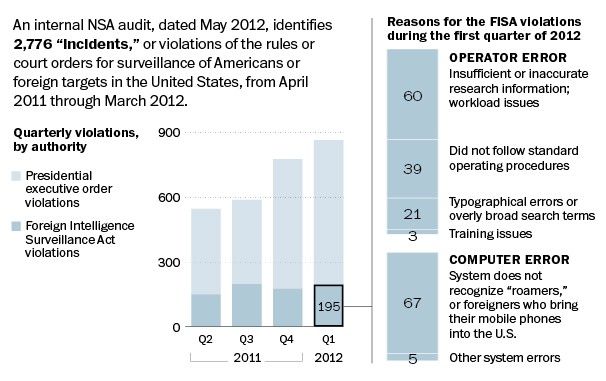Transcript
NSA broke privacy rules thousands of times per year, audit finds
By Barton Gellman, Washington Post
Published: August 15
The documents, provided earlier this summer to The Washington Post by former NSA contractor Edward Snowden, include a level of detail and analysis that is not routinely shared with Congress or the special court that oversees surveillance. In one of the documents, agency personnel are instructed to remove details and substitute more generic language in reports to the Justice Department and the Office of the Director of National Intelligence.
In one instance, the NSA decided that it need not report the unintended surveillance of Americans. A notable example in 2008 was the interception of a “large number” of calls placed from Washington when a programming error confused the U.S. area code 202 for 20, the international dialing code for Egypt, according to a “quality assurance” review that was not distributed to the NSA’s oversight staff.
In another case, the Foreign Intelligence Surveillance Court, which has authority over some NSA operations, did not learn about a new collection method until it had been in operation for many months. The court ruled it unconstitutional.
…
The May 2012 audit, intended for the agency’s top leaders, counts only incidents at the NSA’s Fort Meade headquarters and other facilities in the Washington area. Three government officials, speaking on the condition of anonymity to discuss classified matters, said the number would be substantially higher if it included other NSA operating units and regional collection centers.
…
In October 2011, months after the program got underway, the Foreign Intelligence Surveillance Court ruled that the collection effort was unconstitutional. The court said that the methods used were “deficient on statutory and constitutional grounds,” according to a top-secret summary of the opinion, and it ordered the NSA to comply with standard privacy protections or stop the program.
James R. Clapper Jr., the director of national intelligence, has acknowledged that the court found the NSA in breach of the Fourth Amendment, which prohibits unreasonable searches and seizures, but the Obama administration has fought a Freedom of Information lawsuit that seeks the opinion.
Generally, the NSA reveals nothing in public about its errors and infractions. The unclassified versions of the administration’s semiannual reports to Congress feature blacked-out pages under the headline “Statistical Data Relating to Compliance Incidents.”
…
Under NSA auditing guidelines, the incident count does not usually disclose the number of Americans affected.
Court: Ability to police U.S. spying program limited
By Carol D. Leonnig, Washington Post
Published: August 15
The chief judge of the Foreign Intelligence Surveillance Court said the court lacks the tools to independently verify how often the government’s surveillance breaks the court’s rules that aim to protect Americans’ privacy. Without taking drastic steps, it also cannot check the veracity of the government’s assertions that the violations its staff members report are unintentional mistakes.
“The FISC is forced to rely upon the accuracy of the information that is provided to the Court,” its chief, U.S. District Judge Reggie B. Walton, said in a written statement to The Washington Post. “The FISC does not have the capacity to investigate issues of noncompliance, and in that respect the FISC is in the same position as any other court when it comes to enforcing [government] compliance with its orders.”
…
The court’s description of its practical limitations contrasts with repeated assurances from the Obama administration and intelligence agency leaders that the court provides central checks and balances on the government’s broad spying efforts. They have said that Americans should feel comfortable that the secret intelligence court provides robust oversight of government surveillance and protects their privacy from rogue intrusions.
President Obama and other government leaders have emphasized the court’s oversight role in the wake of revelations this year that the government is vacuuming up “metadata” on Americans’ telephone and Internet communications.
“We also have federal judges that we’ve put in place who are not subject to political pressure,” Obama said at a news conference in June. “They’ve got lifetime tenure as federal judges, and they’re empowered to look over our shoulder at the executive branch to make sure that these programs aren’t being abused.”
Privacy advocates and others in government have voiced concerns about the ability of overseers to police secret programs of immense legal and technological complexity. Several members of the House and Senate intelligence committees told The Post last week that they face numerous obstacles and constraints in questioning spy agency officials about their work.
N.S.A. Often Broke Rules on Privacy, Audit Shows
By CHARLIE SAVAGE, The New York Times
Published: August 16, 2013
Another newly disclosed document included instructions for how N.S.A. analysts should record their rationales for eavesdropping under the FISA Amendments Act, or F.A.A., which allows wiretapping without warrants on domestic networks if the target is a noncitizen abroad. The document said analysts should keep descriptions of why the people they are targeting merit wiretapping to “one short sentence” and avoid details like their names and supporting information.
“While we do want to provide our F.A.A. overseers with the information they need, we DO NOT want to give them any extraneous information,” it said.
A brief article in an internal N.S.A. newsletter offered hints about a known but little-understood episode in which the Foreign Intelligence Surveillance Court found in 2011 that the N.S.A. had violated the Fourth Amendment. The newsletter said the court issued an 80-page ruling on Oct. 3, 2011, finding that something the N.S.A. was collecting involving “Multiple Communications Transactions” on data flowing through fiber-optic networks on domestic soil was “deficient on statutory and constitutional grounds.”
NSA under renewed fire after report finds it violated its own privacy rules
Spencer Ackerman, The Guardian
Friday 16 August 2013 11.09 EDT
The Washington Post reported, with information provided by whistleblower Edward Snowden, that internal NSA audits found thousands of instances where the powerful surveillance agency collected, stored and possibly searched through vast swaths of information it is not permitted to acquire.
The revelations contradict repeated assurances this summer from senior Obama administration and intelligence officials that the NSA’s programs to collect Americans’ phone records and foreigners’ communications in bulk contain adequate privacy protections.
…
On the few occasions when intelligence officials have publicly discussed the impact their broad surveillance powers have on Americans, they have affirmed that all problems are mere accidents and are often promptly corrected.
A July 26 letter by James Clapper, the director of US national intelligence, to senator Ron Wyden, a member of the Senate intelligence committee, discussing the NSA’s bulk collection of Americans phone records assured that “safeguards and controls” provide “reasonable assurance that NSA’s activities are consistent with law and policy and help detect when mistakes do occur, as they inevitably do in activities this complex.”
Those mistakes, Clapper continued, amounted to “a number of compliance problems that have been previously identified and detailed in reports to the court and briefings to Congress as a result of Department of Justice reviews and internal oversight. However, there have been no findings of any intentional or bad-faith violations.”
Numerous intelligence and administration officials have made similar statements in congressional testimony and public speeches.
Wyden, a persistent critic of the bulk phone records collection, responded on the Senate floor that “these violations are more serious than those stated by the intelligence community, and are troubling.” Wyden did not specify what he meant, citing classification restrictions, but urged senators to read NSA’s secret compliance reports in designated congressional chambers.
…
In an earlier speech, to the Center for American Progress, Wyden said a “culture of misinformation” exists inside the US intelligence agencies – directed not just at US adversaries, but the US legislators that are designed to oversee them and the US public in whose name they act.
“When did it become all right for government officials’ public statements and private statements to differ so fundamentally?” Wyden asked. “The answer is that it is not all right, and it is indicative of a much larger culture of misinformation that goes beyond the congressional hearing room and into the public conversation writ large.”
Clapper is perhaps the most prominent public example of that culture.
In March, the director of national intelligence testified to Wyden that the NSA does “not wittingly” collect any type of data on millions of Americans, a statement proven untrue by the Guardian’s June publication of a Fisa court order for ongoing, bulk surveillance of Americans’ phone records.
Clapper has since apologized to Wyden, saying first that it was the “least untruthful answer” he could give publicly and later that he made a good-faith error, having “forgotten” momentarily the NSA program, conducted ostensibly under the Patriot Act, that collected precisely such data.
Civil liberties organizations reacted with outrage to the latest disclosure.
“The number of ‘compliance incidents’ is jaw-dropping. The rules around government surveillance are so permissive that it is difficult to comprehend how the intelligence community could possibly have managed to violate them so often,” Jameel Jaffer, the ACLU’s deputy legal director, said in a statement.
“Obviously it’s important to know what precisely these compliance incidents involved, and some are more troubling than others. But at least some of these incidents seem to have implicated the privacy of thousands or millions of innocent people.”
‘Jaw-Dropping’ Record of Violations Reveals Perils of NSA Self-Policing
Jon Queally, Common Dreams
Published on Friday, August 16, 2013
Jameel Jaffer, deputy legal director for the ACLU, called the scale of the violations “jaw-droppping.”
“The rules around government surveillance are so permissive that it is difficult to comprehend how the intelligence community could possibly have managed to violate them so often,” said Jaffer in a statement. “Obviously it’s important to know what precisely these compliance incidents involved, and some are more troubling than others. But at least some of these incidents seem to have implicated the privacy of thousands or millions of innocent people.”
One aspect that the ACLU finds particularly worrying is the degree to which the FISA Court, designed to oversee these surveillance programs, is at the mercy of the spy agency itself when it comes to garnering information.
“That the FISA court is so reliant on the representations of intelligence officials is a real problem. In recent months, intelligence officials have made misleading and even false statements about the government’s surveillance activities,” Jaffer said. “It makes no sense at all to let the intelligence community police itself.”
Sen. Leahy calls new hearing on NSA, wants ‘straight answers’
By Jennifer Martinez, The Hill
08/16/13 11:22 AM ET
Leahy’s announcement about the additional hearing comes a day after an internal NSA audit published by The Washington Post revealed that the spy agency had repeatedly broken privacy rules or overstepped its authority.
“The American people rely on the intelligence community to provide forthright and complete information so that Congress and the courts can properly conduct oversight. I remain concerned that we are still not getting straightforward answers from the NSA,” Leahy said in a statement.
“I plan to hold another hearing on these matters in the Judiciary Committee and will continue to demand honest and forthright answers from the intelligence community.”
…
Leahy has been critical of the surveillance programs and introduced a bill that aims to rein in the NSA’s phone data collection program.
“Using advanced surveillance technologies in secret demands close oversight and appropriate checks and balances, and the American people deserve no less than that,” Leahy said.
Pelosi: NSA report ‘extremely disturbing’
By Brendan Sasso, The Hill
08/16/13 09:40 AM ET
House Democratic Leader Nancy Pelosi (Calif.) said on Friday that a report that the National Security Agency broke privacy rules thousands of times per year is “extremely disturbing.”
She argued that under the law, the NSA should have reported the violations to Congress and the Foreign Intelligence Surveillance Act Court.
“Congress must conduct rigorous oversight to ensure that all incidents of non-compliance are reported to the oversight committees and the FISA court in a timely and comprehensive manner, and that appropriate steps are taken to ensure violations are not repeated,” she said in the statement.
Pelosi’s comment represents some of her harshest criticism of the NSA since leaks earlier this summer publicized the scope of the agency’s surveillance.
She voted against a House measure last month that would have curbed the NSA’s phone data collection program, but has called for greater transparency and expressed concern that there are insufficient privacy protections.
The Snowden Effect, Continued
By Charles P. Pierce, Esquire
10:05AM 8/16
It’s well past time for another Church Committee — or, if you will, another Pecora Commission — dedicated to a full exposition of the surveillance state and its place in our lives and in our democracy. No half-truths. No hedging. No James Clappers, slow-dancing with perjury and obstruction of Congress. Put people under oath and compel their testimony as to what is being done in our name, especially what is being done to us in our name. If we’re going to have a “national conversation,” then let’s have a by-god national conversation, and let it be held in the place where we are supposed to have our national conversations on issues like this — in the Congress, among our elected representative, out in the open and in the light of day. Let us at least have all the information so we can decide for ourselves how to keep ourselves safe. We are not fragile children. We’re the world’s oldest democracy. We should damned well begin to raise hell and act like it.
Absent that, here’s what now should be taken as an operating procedure in any discussion of the NSA and/or the surveillance state. First, everything they say is a lie, or, at best, a quarter-truth. Second, any argument based on the fundamental premise of “Trust us,” should cause the person making the argument to be laughed out of government service forever. Third, any defense based on the alleged safeguards of either the FISA Court, or the responsible committees of the Congress is prima facie worthless, whether it comes from your favorite pundit, your favorite congresscritter, or, especially, your favorite President of the United States.
Leno Part 2
Part 1, Part 3, Part 4
Aug 9, 2013
ProPublica

 It took 70 years of struggle by women of the Suffrage Movement headed by Susan B. Anthony to get this amendment passed.
It took 70 years of struggle by women of the Suffrage Movement headed by Susan B. Anthony to get this amendment passed. 

